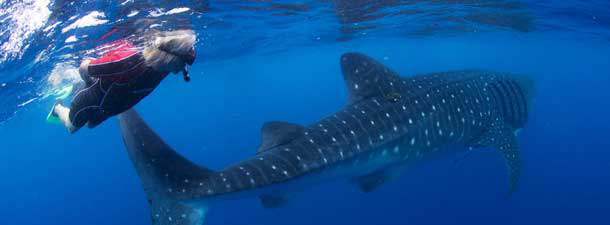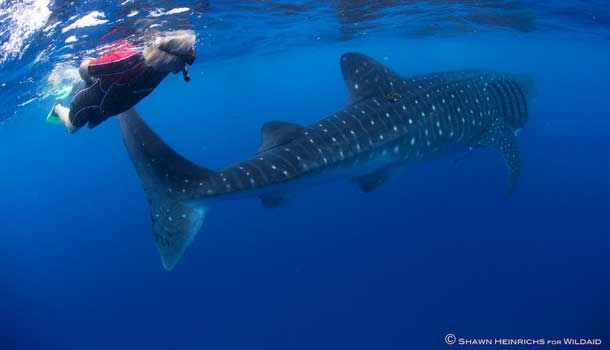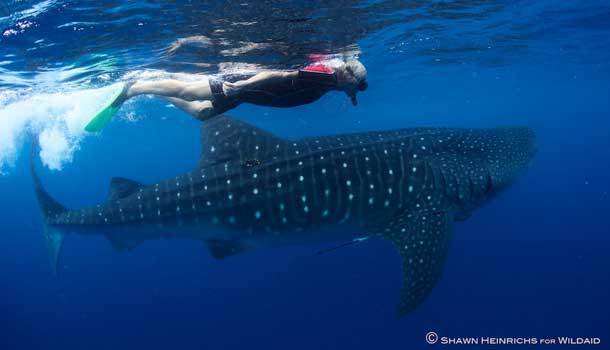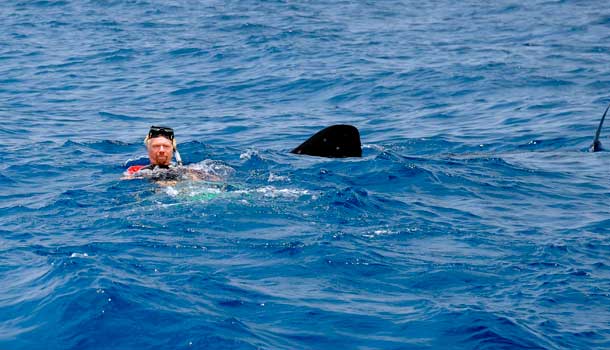
Nonno Panda and … a Goblin an Elf and a Fairy
September 3, 2012
Green Rock
September 10, 2012Mexico’s Eco-tourism Quest: In Search of a Gentle Shark

Sir Richard Branson swimming with whale sharks off the coast of Mexico. Courtesy David Dyson
A gentle shark seems a laughable contradiction in terms – the stuff of sketch comedy routines. But the whale shark pretty much qualifies. And it’s doing about as well as you’d expect, in today’s tough marine environment – that is to say, not very well at all. But Mexico, in partnership with a number of agencies, is working to preserve and protect this very ancient and vulnerable creature.
By Massimo Gava.
Do Hemingway’s blood-soaked tales of deep sea fishing leave you cold? Can’t stand to see dolphins reduced to cheap party tricks in tacky man-made sea parks? Genuinely feel concern over the desperate need for marine conservation? Do you agree with former US President George W. Bush’s wisdom: “I know the human being and fish can coexist peacefully.” ? Still want to sip the perfect margarita, be serenaded by mariachis, and eat your ceviche with a clear conscience, while helping the environment and undertaking an eco-tourism adventure that will stay etched in memory forever? Then swimming with the epic whale shark in the Caribbean waters off Cancún, Mexico may just be the ticket for you.

Sir Richard Branson swimming
with whale sharks off the coast of Mexico.
Courtesy Shawn Heinrichs for Wildaid
And don’t let the name put you off. It is indeed a shark, belonging to a species some 60 million years old, so it’s also a dinosaur. It is a vegetarian on the whole, feeding off algae and plankton, though it has been observed swallowing whole schools of fish on occasion. It is most certainly not the man-eating variety of shark Peter Benchley first terrorised us with in the book Jaws, and later immortalised on film – causing successive generations of movie goers to be paralysed by the thought of ever swimming in the sea.
In fact, the whale shark is a highly docile – one could even say friendly – fish. It is the largest fish in existence, with the biggest found thus far measuring nearly thirteen metres long and weighing some twenty-one-and-half metric tons. That’s why it is named after its mammal counterpart and rival for biggest living creature swimming in the sea – the whale.
Whale sharks are actually so docile that humans can swim with them. Younger whale sharks have repeatedly been observed actually playing with swimmers. The problem is that since they habitually swim so close to the surface, they are easy prey for fishermen. They are now increasingly at risk from commercial fishing in all the tropical seas that are their natural waters, from Central America to Southeast Asia.

Sir Richard Branson swimming
with whale sharks off the coast of Mexico.
Courtesy Shawn Heinrichs for Wildaid
But Mexico, together with a host of international NGOs, is helping to lead the way in preserving the majestic whale shark for future generations and conserving the natural order of the aquatic ecosystem. Mexico’s Yucatan peninsula, where the waters of the Caribbean and the Gulf of Mexico meet, has long been one of the corners of the globe where whale sharks proliferate. “Mexico regards the abundance of whale sharks in its waters as part of its natural patrimony and is keen to defend the species by raising greater awareness through the promotion of responsible eco-tourism,” said Manuel Diaz Cebrian, the UK, Ireland and Scandinavia Regional Director of the Mexican Tourist Board. “For this reason,” he says, “recently the Mexican government, in partnership with the Travel Foundation, has devised a guidebook of suggested rules and regulations for swimmers and divers to be enforced not just in Mexican waters but, it is hoped, worldwide.”
Protecting the whale shark and diminishing the impact of excessive commercial fishing of the species is not only good for the environment but seems to make economic sense. Globally, the whale shark industry generates only some 47 million dollars in revenue, where the gentle giants are fished primarily for shark fin soup. By contrast, the carefully managed preservation of a just a single whale shark over the course of its lifetime is worth an estimated 2.09 million dollars in eco-tourist revenue, according to marine biologists and conservationists.
As the whale shark gains greater prominence as an endangered species worth safeguarding, one of the most recent advocates for its preservation has been British tycoon Richard Branson, founder of the Virgin commercial empire. A host of Virgin companies are now partnered with the NGO Wildaid to encourage more responsible eco-tourism in Mexico’s Yucatan peninsula.

Sir Richard Branson swimming with
whale sharks off the coast of Mexico.
Courtesy David Dyson
Now you may not be a multi-billionaire adventurer but you don’t need to be one to glimpse the beauty of a whale shark, firsthand. The Yucatan peninsula is home to a wide array of specialised tour companies that will take you on your own sea safari. So if you’re seeking that once-in-a-lifetime experience with one of the wonders of the sea, pack your bags and head to the Isla Contoy National Park in Cancún. Try to plan your trip anytime between May and September, when whole schools of whale sharks gather to feed.
Your dollars will not only boost the local economy, they will help raise awareness and allow greater resources to be used to protect a spectacularly beautiful creature that the Vietnamese have, since time immemorial, referred to as Ca Ong or Sir Fish. Sir Fish needs your help and support.

Scuba-divers swimming
close to a whale shark
[note]

Virgin Atlantic flies twice weekly from London Gatwick to Cancún.
For further information visit: Virgin Atlantic.
Virgin Holidays is a member of ABTA and is ATOL protected.
For further information visit: Virgin Holidays

For further information visit: Visit Mexico.
[/note]




